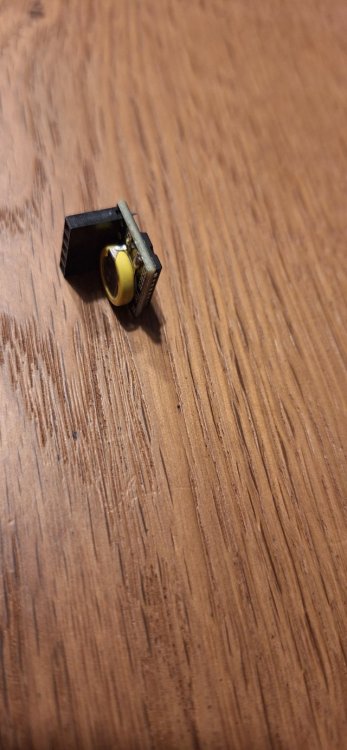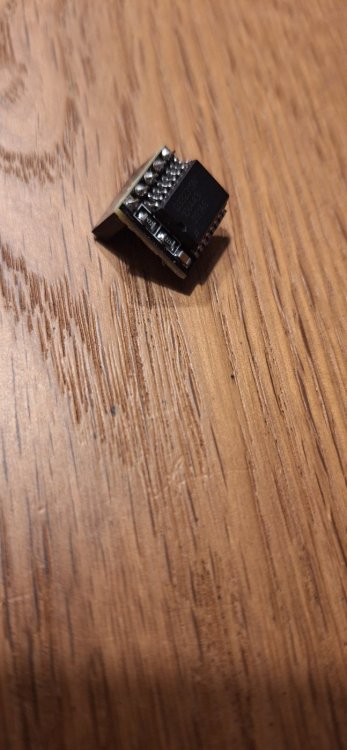
Ed van den Enden
Members-
Posts
18 -
Joined
-
Last visited
Recent Profile Visitors
The recent visitors block is disabled and is not being shown to other users.
-
Hi @djurny Just to inform you that, after cleaning out some mess I made, your overlay and armbianEnv.txt update to make the external RTC ds3231 to work, did the job. For my SBC's I use the Banana Pi M2 Zero and v25.5 rolling for Banana Pi M2 Zero running Armbian Linux 6.6.75-current-sunxi My application needs to work in the field as an Access Point with an RTC, the right date and time is important info in the diagnostics of my applications. A remark on the mentioned Armbian release: For using the GPIO pins of the SBC, python3-libgpiod works great. I use USB camera's (V4L2 camera). After any update or upgrade, my USB camera's won't work anymore. Not really a problem for me, because I'm happy as it works right now, no updates or upgrades needed. Thanks again for your great help. Met vriendelijke groet, Ed
-
@djurny Sorry for the super late response. Here the answers on your questions: ls -Failh /dev/rtc* 457 lrwxrwxrwx 1 root root 4 Mar 7 01:56 /dev/rtc -> rtc0 107 crw------- 1 root root 253, 0 Mar 7 01:56 /dev/rtc0 542 crw------- 1 root root 253, 1 Mar 7 01:56 /dev/rtc1 ls -Failh /sys/class/rtc/ total 0 3926 drwxr-xr-x 2 root root 0 Jan 1 1970 ./ 10 drwxr-xr-x 63 root root 0 Jan 1 1970 ../ 8295 lrwxrwxrwx 1 root root 0 Jan 1 1970 rtc0 -> ../../devices/platform/soc/1f00000.rtc/rtc/rtc0/ 21463 lrwxrwxrwx 1 root root 0 Sep 3 23:18 rtc1 -> ../../devices/platform/soc/1c2ac00.i2c/i2c-0/0-0068/rtc/rtc1/ egrep -- . /sys/class/rtc/*/name /sys/class/rtc/rtc0/name:sun6i-rtc 1f00000.rtc /sys/class/rtc/rtc1/name:rtc-ds1307 0-0068 dmesg | egrep -i -- 'rtc' [ 1.042165] sun6i-rtc 1f00000.rtc: registered as rtc0 [ 1.042235] sun6i-rtc 1f00000.rtc: setting system clock to 1970-01-01T00:00:04 UTC (4) [ 1.774229] sun4i-drm display-engine: [drm] Cannot find any crtc or sizes [ 1.776966] sun4i-drm display-engine: [drm] Cannot find any crtc or sizes [ 19.347508] rtc-ds1307 0-0068: registered as rtc1 sudo hwclock --rtc=/dev/rtc0 # per default this is the H2+ built-in RTC 2025-09-03 23:32:07.935209+10:00 ==> date set to Australia (Tasmania) sudo hwclock --rtc=/dev/rtc1 # per default this is going to be the I2C RTC 2000-01-02 15:51:14.147878+11:00 ==> ?????????? So, I clearly don't understand the system. What do I want? Just the right time when connected to a wireless network. (If not available, my system switches to being an Access Point) If my system is acting as an Access Point, the date and time needs to be correct to, that's why I thought I need an RTC module. If not needed, how do I get the right time when my system operates as an Access Point. Thanks for helping
-
@going @djurny @IBV Reason why I need an working hardware clock: Because my access point need to work without internet connection, but with always the right date and time. Following made the battery operated hardware clock ds3132 to work: OS: Armbian Bookworm from 24-04-2025 apt-get update (No upgrade! ) Edit /boot/armbianEnv.txt add following lines: overlays=i2c0 dtoverlay=i2c-rtc,ds1307 Edit /etc/modules add following lines i2c-dev aml_i2c Edit /etc/rc.local add following lines echo ds1307 0x68 > /sys/class/i2c-adapter/i2c-0/new_device hwclock -s Reboot Check date and eventual correct date and time. Check if the i2c has the right status with: i2cdetect -y 0 ==> address 068 should show UU Check hwclock is communicating with: hwclock --verbose Save the right system time to the hwclock with: hwclock -w Check if you can read hwclock with: hwclock -r
-
I will leave it for what it is for now. I will move back to RPi zero 2W, solder an antenna, and I'm good to go. Would have loved to go to the BPI m2z and later to the BPI m4z, but for now not an option. By the way, with the latest Armbian upgrade an hour ago, my USB camera is also not working anymore. Thank you very much for the support. Kind regards, Ed👏
-
Nop, that didn't work had also both i2c0 and i2c1 activated root@clearview:~# i2cdetect -y 0 0 1 2 3 4 5 6 7 8 9 a b c d e f 00: -- -- -- -- -- -- -- -- 10: -- -- -- -- -- -- -- -- -- -- -- -- -- -- -- -- 20: -- -- -- -- -- -- -- -- -- -- -- -- -- -- -- -- 30: 30 -- 32 33 34 35 36 -- -- -- -- -- -- -- -- -- 40: -- -- -- -- -- -- -- -- -- -- -- -- -- -- -- -- 50: 50 51 52 53 54 55 56 57 58 59 5a 5b 5c 5d 5e 5f 60: -- -- -- -- -- -- -- -- -- -- -- -- -- -- -- -- 70: -- -- -- -- -- -- -- -- root@clearview:~# i2cdetect -y 1 Error: Could not open file `/dev/i2c-1' or `/dev/i2c/1': No such file or directory root@clearview:~# ls /dev/i2c-* /dev/i2c-0
-
The below output with the RTC module taken off the BPI M2Z Further below I saw that there were some pin errors. (most probably nothing to do with this topic) https://paste.armbian.com/axoduwanuq [ 1.020506] usbcore: registered new interface driver usb-storage [ 1.022284] sun6i-rtc 1f00000.rtc: registered as rtc0 [ 1.022371] sun6i-rtc 1f00000.rtc: setting system clock to 1970-01-01T00:00:04 UTC (4) [ 1.023147] i2c_dev: i2c /dev entries driver [ 1.025025] sunxi-wdt 1c20ca0.watchdog: Watchdog enabled (timeout=16 sec, nowayout=0) [ 7.721526] sun8i-h3-pinctrl 1c20800.pinctrl: pin PD14 already requested by onewire@0; cannot claim for pps@0 [ 7.721577] sun8i-h3-pinctrl 1c20800.pinctrl: pin-110 (pps@0) status -22 [ 7.721597] sun8i-h3-pinctrl 1c20800.pinctrl: could not request pin 110 (PD14) from group PD14 on device 1c20800.pinctrl [ 7.721613] pps-gpio pps@0: Error applying setting, reverse things back
-
When connected to WiFi root@clearview:~# timedatectl status Local time: Wed 2025-04-23 09:56:59 CEST Universal time: Wed 2025-04-23 07:56:59 UTC RTC time: Wed 2025-04-23 07:56:58 Time zone: Europe/Brussels (CEST, +0200) System clock synchronized: no NTP service: active RTC in local TZ: no After power down and disconnected from WiFi root@clearview:~# timedatectl status Local time: Wed 2025-04-23 10:04:43 CEST Universal time: Wed 2025-04-23 08:04:43 UTC RTC time: Wed 1970-01-01 00:02:45 Time zone: Europe/Brussels (CEST, +0200) System clock synchronized: no NTP service: active RTC in local TZ: no


